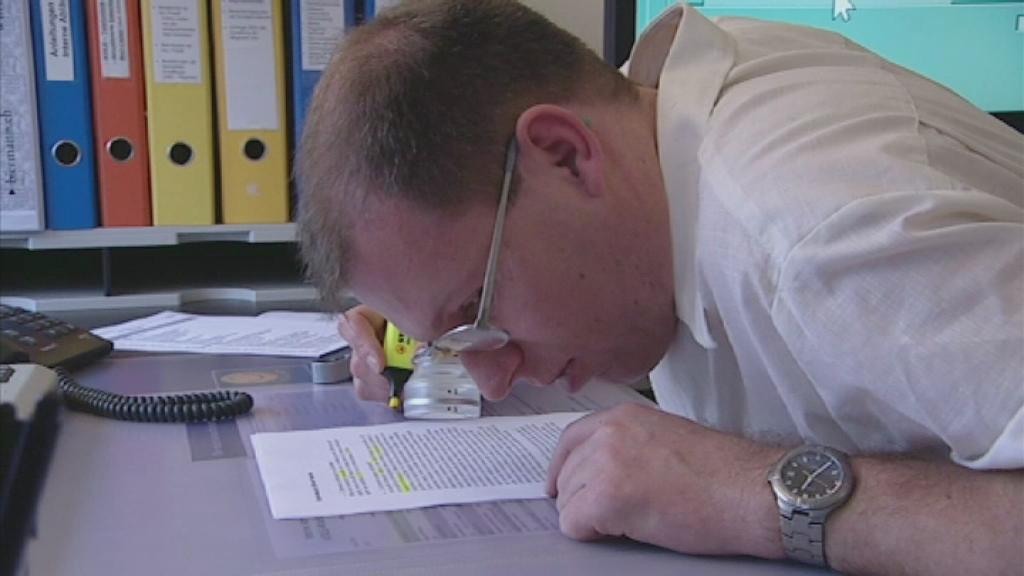Disability insurance feels the strain

Increased pressure at the work place and problems related to immigration and poverty have put an increasing burden on Switzerland's disability insurance scheme.
But if a programme aimed at putting the finances of the scheme in order is accepted by the Swiss electorate on September 27, there is a risk that the costs could simply be transferred to other social insurances.
Between 1992 and 2006 more and more older people, depressed at the thought of never being able to find another job, claimed benefits under the scheme, according to a report published at the beginning of July by the Federal Social Security Office.
The Social Security Office had called for the investigation to learn more about a worrying phenomenon, namely the sharp increase over the past 20 years of people obtaining benefits because of psychological problems.
Today, almost 40 per cent of those who benefit from the scheme fall in this category, compared with 28 per cent in 1997.
Problems of society
Among the factors cited to explain the trend, the study mentions health but also people’s psychosocial condition and problems of society. The Social Security Office notes that categories most affected include the older unemployed, people bringing up children on their own and those whose difficulties are connected to an immigration background.
Originally created to help invalids and disabled people, the insurance with its debts of SFr13 billion ($12.5 billion) has been hit hard over the past years by the effects of changes in society and the economy.
It starts with the changes that have affected the labour market. “On the whole, pressure at the workplace is very high in Switzerland,” noted the Swiss Health Observatory in 2008. It added that “the psychological and psychosocial demands of work have increased”.
Brigitta Danuser, professor of occupational health at Lausanne University, gives an example: “Labour contracts that vary from the norm are increasing, the fear of losing one’s job creates an extraordinary stress and general anxiety is rising.”
This situation, she argues, is without doubt the reason for many of the benefits paid out by the insurance scheme, whether they are claimed on physical or psychological grounds.
“Psychological problem”
“In many cases I have the feeling that many people are demonstrating through their bodies that they are entitled to such an insurance pension, without actually realising that their physical pain is the expression of a psychological problem.”
However, with the fourth and fifth revisions of the scheme which came into force at the beginning of 2008, the trend is clearly being restricted. The scheme’s offices have been asked to put the emphasis on integrating people back into the work force, and to do the best they can to avoid job losses.
It’s been a success according to Alard du Bois-Reymond, deputy director of the Federal Social Security Office and head of the disability insurance unit. “If these measures had been introduced earlier, the increase of beneficiaries with psychological problems could have been avoided.”
Ursula Schaffner, deputy central secretary of the Swiss Disabled Self-Help organisation Agile, is more critical. “For years parliament has slept and has done nothing to put the insurance scheme on a healthier footing”. She points out that now the deficit is increasing, some people remember that one of the scheme’s goals was reintegration.
Both Danuser and Schaffner are in favour of additional financing of the disability insurance that will be the put to a national vote on September 27.
But they point out that there is a paradox in trying to put beneficiaries back into the labour market when many of them had to leave it precisely because of problems relating to their profession or their difficulty in holding down a job.
Reintegration… realistic?
At the political level, the government has sent out the first phase of the sixth revision of the disability insurance for consultation. It is hoped to reduce the number of beneficiaries by looking retroactively at how 12,500 were attributed. The aim is reintegration into the labour market.
“Unrealistic” according to Schaffner. “We are of course not opposed to reintegration but it’s already extremely difficult to find jobs for people with a minor handicap. What about beneficiaries who haven’t worked for the past 12 or 15 years?”
She believes that costs will therefore be transferred from disability insurance to other insurances, in particular social benefit.
It is worth noting that the disability insurance is administered at the federal level, while social benefit is the domain of the cantons and the communes. “It’s a case of changing purses without really improving matters,” Danuser comments.
But the Federal Social Security Office has a different view and is more positive. “A study on this issue released last spring shows that the disability insurance will not solve its problems on the back of social benefit and vice versa,” said du Bois-Reymond.
“This transfer is a lot less significant than generally believed.”
Carole Wälti, swissinfo.ch (Adapted from French by Robert Brookes)
The insurance came into operation in 1960, 12 years after the old age and survivors insurance scheme.
Since its creation, the disability insurance has been revised five times (1967, 1986, 1991,2003, 2007). The sixth revision is currently being handled by parliament.
Among the beneficiaries of the insurance, 86% (252,000 people) live in Switzerland and 14% abroad. About a third of the beneficiaries are foreigners.
Three quarters of beneficiaries receive a full pension, which is around SFr1,800 a month.
The electorate will be asked whether to accept a temporary increase of Value Added Tax to help ease the strain on the Swiss disability insurance scheme.
Limited to seven years, the increase in theory should have come into force on January 1, 2010. However, parliament put this back to January 1, 2011 after fears expressed by economic circles over the current financial crisis.
The standard VAT rate is at present 7.6%. If approved this would rise to 8%.
The increase would be lower for the hotel industry and for items including books, medication and food.
Supporters of a proposed tax increase to shore up the disability insurance scheme appear to have the upper hand less than three weeks ahead of the vote.
50% of the respondents came out in favour, 32% against, while 18% were still undecided according to an opinion poll by the gfs.berne research and polling institute on behalf of swissinfo’s parent company, the Swiss Broadcasting Corporation.
The survey is based on interviews with 1,203 citizens across the country.
Turnout is expected to hit a below average 34%.

In compliance with the JTI standards
More: SWI swissinfo.ch certified by the Journalism Trust Initiative





You can find an overview of ongoing debates with our journalists here. Please join us!
If you want to start a conversation about a topic raised in this article or want to report factual errors, email us at english@swissinfo.ch.